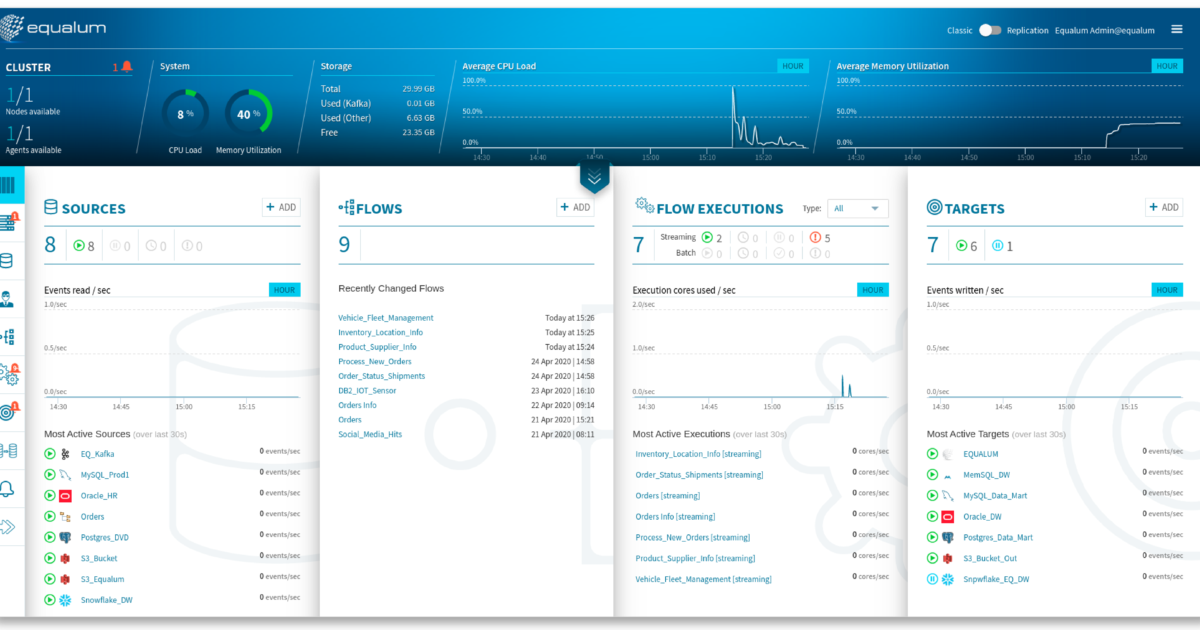The pandemic prompted countless companies to migrate to the cloud. By 2025, driven partly by the need for digital services, 85% of enterprises will have a cloud-first principle, according to Gartner. But the transition isn’t always easy. In a recent MuleSoft survey, 84% of organizations said that data and app integration challenges were hindering their digital transformations and, by extension, their adoption of cloud platforms.
Spurred to meet the need, software engineer Nir Livneh founded Equalum, a startup providing software that integrates with existing infrastructure to process and transform data, including streaming data. Equalum can collect, transform, and synchronize data, moving data in real time or in batches from devices and apps to AI systems, data lakes and data warehouses.
Prior to co-founding Equalum, Livneh was a full stack developer in the U.S. Army and led the product management team at Quest Software (which was acquired by Dell in 2012). He also co-founded S.E.T. Systems, an IT consulting firm focused on data analytics.
“Over the years, Livneh saw that many organizations were struggling to manage their data integration needs. The work was done manually by different tools, which added a lot more complexity to their environment, and, in most cases, the data that was transferred was based on historical data rather than real-time data,” Guy Eilon, Equalum’s CEO, told TechCrunch in an email interview. Eilon was formerly the VP of sales at cybersecurity company Cynet. “[Livneh founded Equalum] to bring simplicity to the data integration market and to enable … organizations to make decisions based on real-time data rather than historical and inaccurate data.”

Equalum manages data pipelines, leveraging open source packages, including Apache Spark and Kafka to stream and batch data processes. The platform allows for data pipeline “logic” to be created using a drag-and-drop interface, including triggers that modify data at the source, perform computations on data, correlate data with third-party sources, and filter, look up, and enrich data.
In this way, Equalum isn’t dissimilar to startups like Striim and StreamSets, which offer tools to build data pipelines across cloud and hybrid cloud platforms (i.e., mixes of on-premises and public cloud infrastructure). Amazon Web Services, Google Cloud, and Azure also sell access to some version of pipeline orchestration technology, albeit unsurprisingly cloud-focused.
It’s evidently been tough to break through the industry — Eilon declined to reveal Equalum’s revenue metrics or the size of the startup’s customer base, and Equalum doesn’t plan to hire this year. But he emphasized the lucrativeness of the opportunity. Citing data from Fortune Business Insights, Eilon expects that the market for data integration solutions will be worth $29.16 billion in 2029 — up from $11.94 billion in 2022.
In any event, investors have faith in Equalum’s growth prospects. The company today closed a $14 million Series C round with contributions from Springtide Ventures — notably a smaller round than Equalum’s Series B, which totaled $18 million. Eilon said it’s because the board “didn’t want to dilute themselves if not needed.”
“There’s a lot of noise in the industry, and we see that the biggest challenge customers are facing these days is that they have been purchasing a variety of integration products for many different use cases. This is creating a very complex environment,” Eilon said. “Moreover, many of the tools need experienced data engineers and a lot of time in order for companies to get the right value from the tool. These complex challenges, along with the shortage in resources globally, are making it a lot more difficult for organizations to get the outcome they desire. Equalum’s unified platform, with our no-code UI, solves these key challenges.”
With the latest infusion of capital, Equalum’s total raised stands at $39 million.































Comment